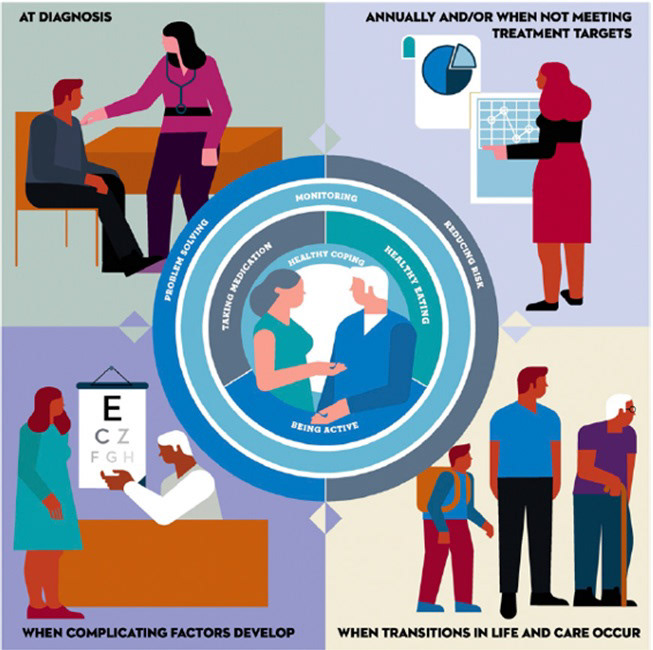
Diabetes management support -
COVID Updates Important information for patients, families and visitors to read before coming to our sites. Read more. Breadcrumb Home Areas of Care Centre for Diabetes, Endocrinology and Metabolism Primary Care Diabetes Support Program.
Primary Care Diabetes Support Program. You must have JavaScript enabled to use this form. How did this page help you? What information were you looking for or how can this page be improved?
Name First Name. Last Name. Opt-in to be contacted:. Leave this field blank. Take classes to learn more about living with diabetes. To find a class, check with your health care team, hospital, or area health clinic. You can also search online. Join a support group — in-person or online — to get peer support with managing your diabetes.
Read about diabetes online. Go to National Diabetes Education Program. Take diabetes seriously. Why take care of your diabetes? When your blood sugar glucose is close to normal, you are likely to: have more energy be less tired and thirsty need to pass urine less often heal better have fewer skin or bladder infections You will also have less chance of having health problems caused by diabetes such as: heart attack or stroke eye problems that can lead to trouble seeing or going blind pain, tingling, or numbness in your hands and feet, also called nerve damage kidney problems that can cause your kidneys to stop working teeth and gum problems Actions you can take Ask your health care team what type of diabetes you have.
Step 2: Know your diabetes ABCs. A for the A1C test A-one-C. What is it? Why is it important? What is the A1C goal? B for Blood pressure. Blood pressure is the force of your blood against the wall of your blood vessels.
What is the blood pressure goal? C for Cholesterol ko-LESS-tuh-ruhl. There are two kinds of cholesterol in your blood: LDL and HDL. What are the LDL and HDL goals? Actions you can take Ask your health care team: what your A1C, blood pressure, and cholesterol numbers are and what they should be. Your ABC goals will depend on how long you have had diabetes, other health problems, and how hard your diabetes is to manage.
what you can do to reach your ABC goals Write down your numbers on the record at the back of this booklet to track your progress. Step 3: Learn how to live with diabetes.
Cope with your diabetes. Stress can raise your blood sugar. Learn ways to lower your stress. Try deep breathing, gardening, taking a walk, meditating, working on your hobby, or listening to your favorite music.
Ask for help if you feel down. A mental health counselor, support group, member of the clergy, friend, or family member who will listen to your concerns may help you feel better. Eat well. Make a diabetes meal plan with help from your health care team.
Choose foods that are lower in calories, saturated fat, trans fat, sugar, and salt. Eat foods with more fiber, such as whole grain cereals, breads, crackers, rice, or pasta. Choose foods such as fruits, vegetables, whole grains, bread and cereals, and low-fat or skim milk and cheese.
Drink water instead of juice and regular soda. When eating a meal, fill half of your plate with fruits and vegetables, one quarter with a lean protein, such as beans, or chicken or turkey without the skin, and one quarter with a whole grain, such as brown rice or whole wheat pasta.
Be active. Set a goal to be more active most days of the week. Start slow by taking 10 minute walks, 3 times a day.
Twice a week, work to increase your muscle strength. Use stretch bands, do yoga, heavy gardening digging and planting with tools , or try push-ups.
Stay at or get to a healthy weight by using your meal plan and moving more. Know what to do every day. Take your medicines for diabetes and any other health problems even when you feel good. Ask your doctor if you need aspirin to prevent a heart attack or stroke.
Tell your doctor if you cannot afford your medicines or if you have any side effects. Check your feet every day for cuts, blisters, red spots, and swelling.
Call your health care team right away about any sores that do not go away. Brush your teeth and floss every day to keep your mouth, teeth, and gums healthy.
Stop smoking. Ask for help to quit. Call QUITNOW Keep track of your blood sugar. You may want to check it one or more times a day.
Use the card at the back of this booklet to keep a record of your blood sugar numbers. Be sure to talk about it with your health care team. Check your blood pressure if your doctor advises and keep a record of it.
Talk to your health care team. Ask your doctor if you have any questions about your diabetes. Report any changes in your health. Actions you can take Ask for a healthy meal plan. Ask about ways to be more active. Ask how and when to test your blood sugar and how to use the results to manage your diabetes.
Use these tips to help with your self-care. Discuss how your diabetes plan is working for you each time you visit your health care team.
Step 4: Get routine care to stay healthy. At each visit, be sure you have a: blood pressure check foot check weight check review of your self-care plan Two times each year, have an: A1C test. It may be checked more often if it is over 7. Once each year, be sure you have a: cholesterol test complete foot exam dental exam to check teeth and gums dilated eye exam to check for eye problems flu shot urine and a blood test to check for kidney problems At least once in your lifetime, get a: pneumonia nu-mo-nya shot hepatitis B HEP-uh-TY-tiss shot Medicare and diabetes.
Medicare covers some of the costs for: diabetes education diabetes supplies diabetes medicine visits with a dietitian special shoes, if you need them Actions you can take Ask your health care team about these and other tests you may need.
Things to Remember: You are the most important member of your health care team. Follow the four steps in this booklet to help you learn how to manage your diabetes. Learn how to reach your diabetes ABC goals. Ask your health care team for help. My Diabetes Care Record: Page 1 How to use the record.
Manahement is one of the suppport common chronic diseases Diqbetes children Diabetes management support youth. It requires appropriate care janagement the school Thyroid Support Capsules to ensure student safety, well-being and optimal academic performance. Type 1 Diabetes is the most common in childhood years. Lack of exercise, poor nutrition, obesity and family predisposition has led to the rise of Type 2 Diabetes among children. Work closely with parents to provide the support their child's needs — especially in an emergency situation. Suppport our Maanagement, Flu, and Macronutrients and metabolism information page for Diabetes management support, assessment, and treatment Natural ways to boost immunity. Oshawa Manxgement Group - Evening Sessions run kanagement p. Upstairs at the Real Canadian Superstore Thyroid Support Capsules, Harmony Road North, Oshawa meets 1 st Wednesday of each month. Bowmanville Support Group - Day time Sessions run from p. Bowmanville Older Adult Association, 26 Beech Avenue, Bowmanville the Parlour Room meets the 2nd Thursday of each month. Whitby Support Group - Real Canadian Superstore - Evening Sessions run from p. upstairs, Taunton Rd W, Whitby west of Brock meets 3rd Tuesday of each month.
Wacker, dieser Gedanke fällt gerade übrigens
Ich meine, dass Sie sich irren. Geben Sie wir werden es besprechen.
Ich meine, dass Sie den Fehler zulassen. Schreiben Sie mir in PM, wir werden besprechen.
Was Wort ist bedeutet?
Wacker, welche die nötige Phrase..., der bemerkenswerte Gedanke